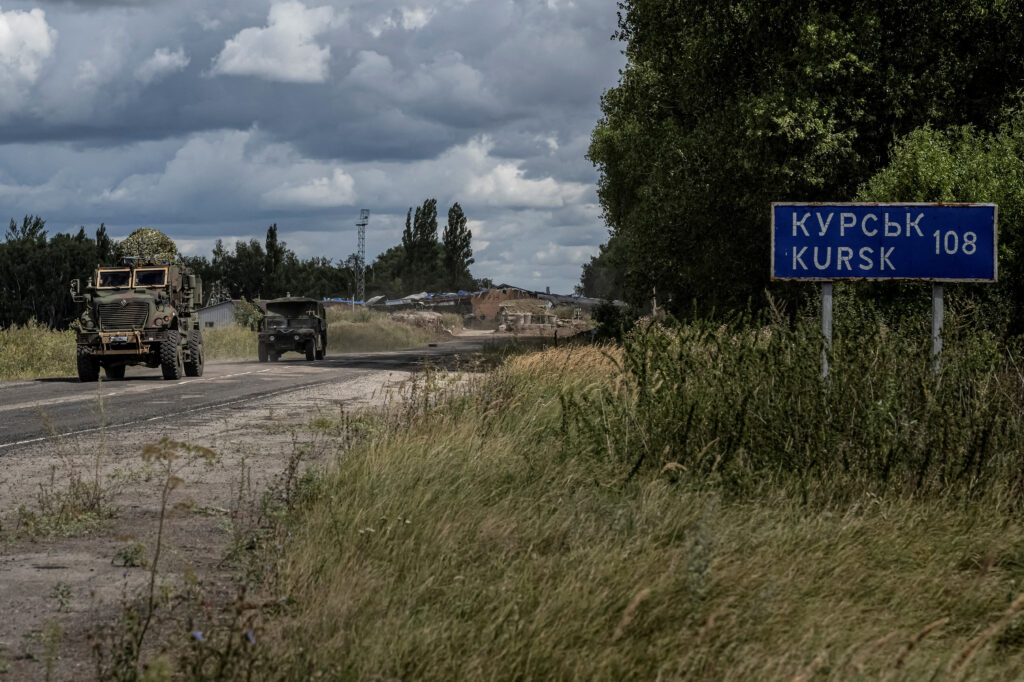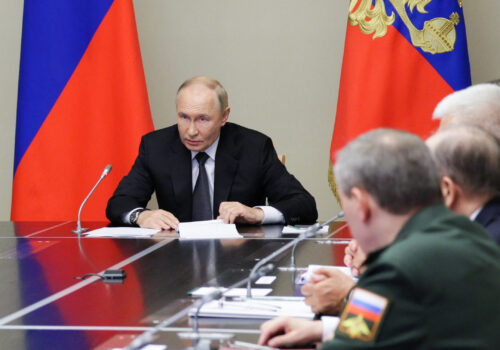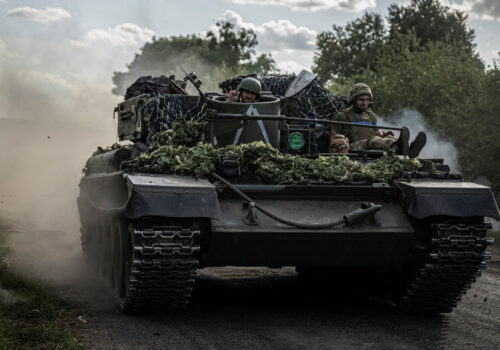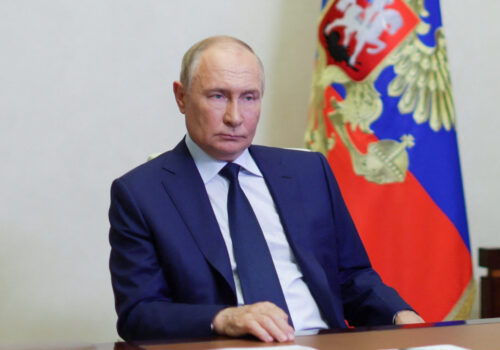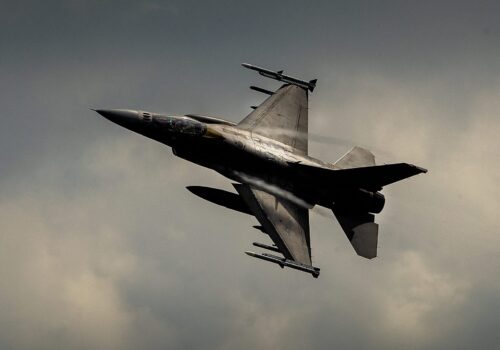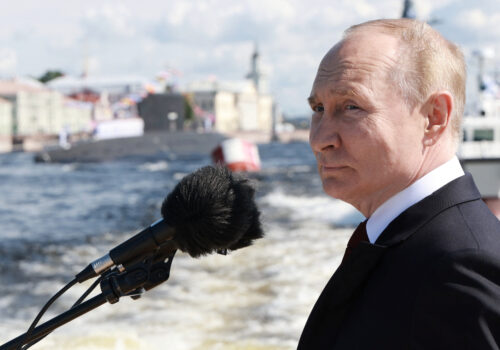Kyiv has this week called on Belarus to withdraw its army from the Ukrainian border and warned of “tragic consequences” if the Belarusian military joins the Russian invasion of Ukraine. The strongly worded August 25 statement from Ukraine’s Ministry of Foreign Affairs came in response to mounting reports of Belarusian troops concentrating close to the country’s shared border with Ukraine.
Ukrainian officials urged their Belarusian counterparts to “cease unfriendly actions” and called for them to pull back beyond firing range. In an apparent bid to spell out the possible consequences of any further escalation, they noted that if the Belarusian military violated the border, “all troop concentrations, military facilities, and supply routes in Belarus will become legitimate targets for the Armed Forces of Ukraine.”
Ukraine’s stern message was officially addressed to Minsk, but there is little doubt in Kyiv that the current Belarusian border buildup has actually been orchestrated by the Kremlin. Indeed, Sunday’s Ukrainian statement specifically cautioned Minsk against acting “under Moscow’s pressure.”
Russia has long sought to deepen Belarus’s involvement in the war against Ukraine, but on this particular occasion the Kremlin is believed to have a very specific goal in mind. Vladimir Putin hopes that by manufacturing a potential Belarusian threat along Ukraine’s northern border, he can force Kyiv to divert troops away from the ongoing Ukrainian invasion of Russia’s Kursk region and ease the pressure on his own overstretched army.
Stay updated
As the world watches the Russian invasion of Ukraine unfold, UkraineAlert delivers the best Atlantic Council expert insight and analysis on Ukraine twice a week directly to your inbox.
Now in its fourth week, Ukraine’s bold cross-border offensive has succeeded in exposing the limitations of Putin’s once vaunted military machine. The Russian army had already experienced a severe loss of status during the first two years of the war thanks to a string of battlefield setbacks and embarrassing defeats. Ukraine’s recent advance into the Russian Federation itself has now done further damage to Russia’s military reputation. In a matter of days, Ukrainian forces have been able to seize more Russian land than Putin’s army gained in Ukraine during the previous seven months.
Faced with the twin challenges of conquering Ukraine and defending Russia, it has become painfully apparent in recent weeks that Vladimir Putin is struggling to do both. With virtually his entire military already committed to the fight in Ukraine, he responded to the initial shock of Kyiv’s Kursk offensive by scraping together a variety of units and calling on untested young Russian conscripts to stem the tide of the Ukrainian invasion.
Recent reports indicate that Russian resistance on the Kursk front is now finally strengthening, but it may still be some time before Moscow is able to liberate the approximately five hundred square miles of Russian territory currently under Ukrainian control and force the Ukrainian military back across the border. In order to deprive Kyiv of momentum and prevent any more unwelcome surprises, it therefore makes perfect military sense for Putin to call upon his Belarusian ally and instruct him to stage a diversion.
READ MORE COVERAGE OF THE KURSK OFFENSIVE
Belarus dictator Alyaksandr Lukashenka has evidently gone along with Putin’s plan and has ordered a significant portion of his military to deploy to the Ukrainian border. Nevertheless, a Belarusian invasion of northern Ukraine remains highly unlikely. While it is true that Lukashenka is almost entirely dependent on the Kremlin for his political survival, both he and Putin appear to understand perfectly well that any attempt to force Belarus into the war could end in disaster.
Lukashenka’s domestic position is precarious enough without engaging in foreign wars. He was almost ousted in 2020 by nationwide protests following a rigged presidential election, and only managed to cling onto power thanks to Moscow’s intervention. This reliance on Russia has robbed Lukashenka of any lingering legitimacy and forced him to accept what some have termed as the “creeping annexation” of his country by the Kremlin.
Meanwhile, Belarusian society has shown virtually no interest in joining Russia’s anti-Ukrainian crusade. While pro-Russian sentiment remains widespread in the country, there is little enthusiasm for the imperial ambitions underpinning the Russian invasion of Ukraine. On the contrary, many Belarusians feel a sense of solidarity with their Ukrainian neighbors, and recognize that today’s resurgent Russian imperialism poses a similar threat to their own country.
This mood has given rise to serious questions about the readiness of the Belarusian military to participate in Russia’s war. Since the start of the full-scale invasion, there have been numerous reports claiming that Belarusian officers are deeply reluctant to fight in Ukraine. If Lukashenka attempts to force them, there is a reasonable chance he will not be obeyed. This could destabilize his regime and lead to unpredictable consequences for the Kremlin.
Eurasia Center events

With little prospect of the Belarusian military joining the invasion of Ukraine, Putin has found different ways for Lukashenka to make himself useful. During the initial phase of the war, the Russian dictator used his Belarusian counterpart’s fiefdom as a gateway for the failed march on Kyiv and as a launch pad for air strikes on targets across Ukraine. Belarus has subsequently continued to offer Russia meaningful practical support, digging deep into its Soviet era stockpiles to deliver large quantities of much-needed military equipment.
Throughout the war, the two leaders have staged frequent personal meetings in an apparent bid to counter perceptions of Putin as an international pariah. Lukashenka has also played a supporting role in Putin’s nuclear saber-rattling, hosting Russian nuclear weapons in Belarus and participating in joint nuclear drills together with the Russian military. The current Belarusian border buildup fits neatly into this pattern, with Lukashenka once again serving as Putin’s accomplice while stopping short of direct military involvement.
For now, the Ukrainian authorities seem content to limit their response to strong words of warning along with a minimum of military precautions. While they cannot afford to completely ignore the presence of the Belarusian army on their border, there is little sign that Ukraine is prepared to slow the pace of its Kursk offensive in order to guard against an invasion threat that few in Kyiv regard as credible. Instead, they appear intent on treating it as yet another Russian ruse and calling Putin’s bluff, just as they have done with his so-called red lines and his attempts at nuclear blackmail.
Peter Dickinson is editor of the Atlantic Council’s UkraineAlert service.
Further reading
The views expressed in UkraineAlert are solely those of the authors and do not necessarily reflect the views of the Atlantic Council, its staff, or its supporters.

The Eurasia Center’s mission is to enhance transatlantic cooperation in promoting stability, democratic values and prosperity in Eurasia, from Eastern Europe and Turkey in the West to the Caucasus, Russia and Central Asia in the East.
Follow us on social media
and support our work
Image: Ukrainian servicemen ride military vehicles from a crossing point at the border with Russia, amid Russia's attack on Ukraine, in Sumy region, Ukraine. August 13, 2024. (REUTERS/Viacheslav Ratynskyi)
